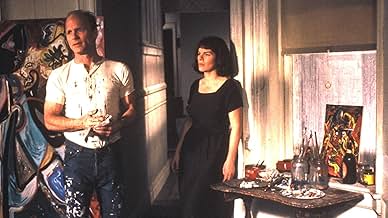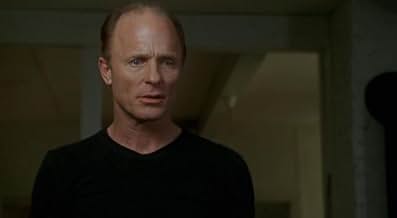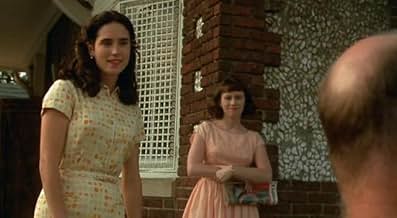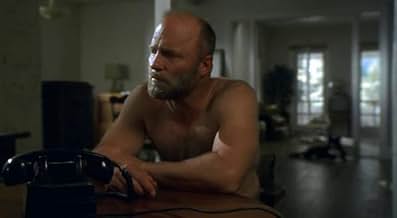CALIFICACIÓN DE IMDb
7.0/10
30 k
TU CALIFICACIÓN
Una película sobre la vida y la carrera del pintor estadounidense Jackson Pollock.Una película sobre la vida y la carrera del pintor estadounidense Jackson Pollock.Una película sobre la vida y la carrera del pintor estadounidense Jackson Pollock.
- Dirección
- Guionistas
- Elenco
- Ganó 1 premio Óscar
- 3 premios ganados y 10 nominaciones en total
Eulala Scheel
- Arloie's Baby
- (as Eulala Grace Harden)
Opiniones destacadas
Pollock (2000)
There's no question this is a well made film, and based pretty much on truth, and an interesting truth--the life of a great Abstract Expressionist. Some would say the greatest of them all.
For myself, this isn't enough, and I know this is me. I'm an art critic and professor of Art in my real life, and I'm never very patient with movies about artists. The reason isn't that there are inaccuracies, but that there is a subtle or not-subtle goal of aggrandizing the subject. This reaches a beautiful but, again, romanticized, peak when Pollock makes his famous break into true gestural, raw work in a large commissioned piece for Peggy Guggenheim (who is portrayed, oddly, as a shy and dull sort, which I've never pictured). Then later he makes his drip works. And then he dies, again over dramatized and made aesthetic, as tragic and ugly as it had to have been in life.
If you want to really get into Pollock's head, especially if you aren't already a fan (I love Pollock's work), this is a convincing movie. At the helm as both director and playing the artist is Ed Harris. He is especially believable as a painter, which is something of an important point. This isn't like those movies about musicians where the actor is clearly not playing. Harris actually paints the darned thing, the big masterpiece, on the cusp of the drip works. I don't know if Harris was drinking, too, but he's a good drunk, and of course Pollock was a better drinker than a painter, even.
It's a cheap shot to say a movie could have been shorter, but this one sure would have propelled better with less atmosphere, less filler that is meant to create his life but is interesting only as an illustration of historical facts. It wore me thin for those reasons. Again, it might be a matter of how much you can get sucked into the given drama that is Jackson Pollock's life. It was quite a life, crude, untempered, brave, and immensely connected to what matters as an artist.
There's no question this is a well made film, and based pretty much on truth, and an interesting truth--the life of a great Abstract Expressionist. Some would say the greatest of them all.
For myself, this isn't enough, and I know this is me. I'm an art critic and professor of Art in my real life, and I'm never very patient with movies about artists. The reason isn't that there are inaccuracies, but that there is a subtle or not-subtle goal of aggrandizing the subject. This reaches a beautiful but, again, romanticized, peak when Pollock makes his famous break into true gestural, raw work in a large commissioned piece for Peggy Guggenheim (who is portrayed, oddly, as a shy and dull sort, which I've never pictured). Then later he makes his drip works. And then he dies, again over dramatized and made aesthetic, as tragic and ugly as it had to have been in life.
If you want to really get into Pollock's head, especially if you aren't already a fan (I love Pollock's work), this is a convincing movie. At the helm as both director and playing the artist is Ed Harris. He is especially believable as a painter, which is something of an important point. This isn't like those movies about musicians where the actor is clearly not playing. Harris actually paints the darned thing, the big masterpiece, on the cusp of the drip works. I don't know if Harris was drinking, too, but he's a good drunk, and of course Pollock was a better drinker than a painter, even.
It's a cheap shot to say a movie could have been shorter, but this one sure would have propelled better with less atmosphere, less filler that is meant to create his life but is interesting only as an illustration of historical facts. It wore me thin for those reasons. Again, it might be a matter of how much you can get sucked into the given drama that is Jackson Pollock's life. It was quite a life, crude, untempered, brave, and immensely connected to what matters as an artist.
10L8nDA
Ed Harris has taken the biopic to a new level. Although the skeleton of the film is no more than the troubled life of an alcoholic struggling with fame, the power of the acting and sequence of the film take it a step further. The relationship between Krasner and Pollock mirrors that of Stanley and Stella Kowalski but Krasner is a much stronger character and Marcia Gay Harden more than deserved the oscar she received for the part. The only part that concerned me was the explanation Harris chose to show Pollock's progression to his drip paintings. The arbitrariness of the "revelation" seems stretched to me and suggests that it is actually known how Pollock made that movement. All in all, the movie is excellent and worth seeing.
Just be careful - I cringed every time he got into a car...
Just be careful - I cringed every time he got into a car...
a good film, though perhaps i was expecting a little more. The psyche of a troubled artist is somewhat predestined these days and maybe it is just that our assumptions are correct as they are all portrayed in a predictable way. If this is how the artist truly was then then Harris could have done nothing different, it just seems a little distant. I didn't feel at one with the artist, i couldn't sympathise with him or feel his pain. The 'intellectual' artistic debates and gendredising continuously used by his wive left me with no sympathy for her. She appears desperate from the first scene pretentiously trying to be involved with the next big thing. The most depressing part of this film is that two people can be stupid enough to waste their lives on each other without searching for the happiness which they truly seek. The emphasis is on Pollock as a man whereas i would like to see more of him as an artist, did his individual paintings have meaning or did he just do them out of hate for the world.... i guess i didn't feel you see his mind and its true agony's, maybe he was just generally mad at the world.
Really not a bad film for what it is, just to me it lacked true emotion.
sio
Really not a bad film for what it is, just to me it lacked true emotion.
sio
Jackson Pollock (Ed Harris) is famous with a Life magazine cover in 1950. The movie flashes back to 1941. He's a drunk staying in Greenwich Village with his brother and pregnant wife. Artist Lee Krasner (Marcia Gay Harden) shows some interest and becomes his lover/supporter. His brother moves to Connecticut. Jackson breaks down which is why he can't be drafted into the war. Lee takes Jackson home acting more and more like his manager. His work eventually gains the attention of art collector Peggy Guggenheim (Amy Madigan) who gives him an one-man show in 1943. Lee and Jackson decides to move to a country house on Long Island away from the drinking and doing more work. His paintings are still not selling and then the Life article happens. Lee and Jackson have a roller-coaster relationship and then he has an affair with Ruth Kligman (Jennifer Connelly).
Ed Harris directs a mostly straight forward biopic of Jackson Pollock with a few fascinating scenes of painting sessions. His directing style doesn't necessarily project Jackson mental breakdowns but his acting is able to bridge the gap. Ed Harris is not the most imaginative director visually but it is overcome by good actors doing good work. It is a good debut directorial effort.
Ed Harris directs a mostly straight forward biopic of Jackson Pollock with a few fascinating scenes of painting sessions. His directing style doesn't necessarily project Jackson mental breakdowns but his acting is able to bridge the gap. Ed Harris is not the most imaginative director visually but it is overcome by good actors doing good work. It is a good debut directorial effort.
Although the film doesn't exactly startle us with its thesis that the life of an artist is rarely a happy one `Pollock' manages to skirt most of the clichés inherent in the `tortured-artist' biographical genre to provide us with a complex study not only of the man himself but also of the woman who stood beside him through most of his troubled life.
Jackson Pollock was, of course, the prototypical `struggling genius' neurotic, insecure, arrogant, self-absorbed and forever locked in an epic struggle with his own private demons (in Pollock's case, alcoholism). Out of this morass of personal weaknesses, the painter perfected his art which became a reflection and synthesis of the raw elements comprising the emotionally chaotic world in which he lived. The film introduces us to the man in 1941 when he is still a virtual unknown living in Greenwich Village, bellowing in an alcoholic rage against the success of Picasso, in whose shadow Pollock seems to be forever hidden away from public view. One day, into his life walks Lee Krasner, a similar, though less gifted, modern artist who detects Pollock's special genius and becomes the future art world celebrity's greatest champion and lover.
Much of the fascination of the film lies in the examination of the complexities of the almost love-hate relationship that develops between the two. On the one hand, we sense that Jackson and Lee provide just the right emotional complement for one another a shared symbiosis which lays the foundation for an environment in which Pollock's creativity and artistic experimentation can expand and flourish. Lee, for instance, wages a fierce battle to secure Pollock's acceptance among the crème de la crème of New York's art world elite, the result of which is eventual name recognition for Pollock the world over. Yet, Lee pays an ultimate price for her tenacious possessiveness: so all consumed does she become in the life and work of the man who will change the face of modern art that she begins to alienate him and eventually push him away. Unwilling to share him even with a child of their own, she ends up depriving Pollock of the chance of experiencing the joys of fatherhood. The final result is that he is truly left with nothing but his identity as a painter. Thus, as his reputation begins to become eclipsed by newer, younger artists, and as he retreats back into an alcoholic haze after a couple of years of productive sobriety, Pollock's life begins its inevitable spiral downwards into hopelessness and tragedy.
Ed Harris not only stars in the film but directed it as well. He does a superb job on both counts. As Pollock, he supplies the brooding sensitivity as well as the physical intensity that are reflected in the artist's paintings themselves. One never doubts the genuine love Pollock has for Lee, yet always there is the constant threat of physical violence lying latent beneath his placid surface. Marcia Gay Harden matches Harris' performance every step of the way. Beneath her determined, hard-edged exterior lies a woman capable of sincere attachment and a total devotion to both a person and the cause he represents.
Unlike so many films dealing with the lives of artists in which we see brief glimpses of paint-dabbing followed almost immediately by views of the finished products `Pollock' provides generous opportunities to see Pollock (i.e. Harris) in action. We sit spellbound as we watch him take a plain white canvas and, step by step, convert it into a work of beauty and art.
If for no other reason, the film is worth seeing just to whet one's appetite and renew one's appreciation for Pollock's work.
Jackson Pollock was, of course, the prototypical `struggling genius' neurotic, insecure, arrogant, self-absorbed and forever locked in an epic struggle with his own private demons (in Pollock's case, alcoholism). Out of this morass of personal weaknesses, the painter perfected his art which became a reflection and synthesis of the raw elements comprising the emotionally chaotic world in which he lived. The film introduces us to the man in 1941 when he is still a virtual unknown living in Greenwich Village, bellowing in an alcoholic rage against the success of Picasso, in whose shadow Pollock seems to be forever hidden away from public view. One day, into his life walks Lee Krasner, a similar, though less gifted, modern artist who detects Pollock's special genius and becomes the future art world celebrity's greatest champion and lover.
Much of the fascination of the film lies in the examination of the complexities of the almost love-hate relationship that develops between the two. On the one hand, we sense that Jackson and Lee provide just the right emotional complement for one another a shared symbiosis which lays the foundation for an environment in which Pollock's creativity and artistic experimentation can expand and flourish. Lee, for instance, wages a fierce battle to secure Pollock's acceptance among the crème de la crème of New York's art world elite, the result of which is eventual name recognition for Pollock the world over. Yet, Lee pays an ultimate price for her tenacious possessiveness: so all consumed does she become in the life and work of the man who will change the face of modern art that she begins to alienate him and eventually push him away. Unwilling to share him even with a child of their own, she ends up depriving Pollock of the chance of experiencing the joys of fatherhood. The final result is that he is truly left with nothing but his identity as a painter. Thus, as his reputation begins to become eclipsed by newer, younger artists, and as he retreats back into an alcoholic haze after a couple of years of productive sobriety, Pollock's life begins its inevitable spiral downwards into hopelessness and tragedy.
Ed Harris not only stars in the film but directed it as well. He does a superb job on both counts. As Pollock, he supplies the brooding sensitivity as well as the physical intensity that are reflected in the artist's paintings themselves. One never doubts the genuine love Pollock has for Lee, yet always there is the constant threat of physical violence lying latent beneath his placid surface. Marcia Gay Harden matches Harris' performance every step of the way. Beneath her determined, hard-edged exterior lies a woman capable of sincere attachment and a total devotion to both a person and the cause he represents.
Unlike so many films dealing with the lives of artists in which we see brief glimpses of paint-dabbing followed almost immediately by views of the finished products `Pollock' provides generous opportunities to see Pollock (i.e. Harris) in action. We sit spellbound as we watch him take a plain white canvas and, step by step, convert it into a work of beauty and art.
If for no other reason, the film is worth seeing just to whet one's appetite and renew one's appreciation for Pollock's work.
¿Sabías que…?
- TriviaEd Harris's father, Bob L. Harris, bought his son a book about Jackson Pollock simply because he felt Ed bore a strong resemblance to the painter. Ever since then, Ed Harris became fascinated with Pollock's life.
- ErroresWhen the photographer is making the movie of Pollock, he "zooms" in on the shoes. But the old 16 mm camera he is using has a turret with three fixed lenses; thus, he should not be able to zoom. All his other shots are as expected from fixed lenses of different focal lengths.
- Citas
Jackson Pollock: If people would just look at the paintings, I don't think they would have any trouble enjoying them. It's like looking at a bed of flowers, you don't tear your hair out over what it means.
- Bandas sonorasThe Mighty Blues
Improvisation
Performed by The Port of Harlem Jazzmen
Courtesy of Blue Note Records
By Arrangement with EMI Capitol Music Special Markets
Selecciones populares
Inicia sesión para calificar y agrega a la lista de videos para obtener recomendaciones personalizadas
- How long is Pollock?Con tecnología de Alexa
Detalles
Taquilla
- Presupuesto
- USD 6,000,000 (estimado)
- Total en EE. UU. y Canadá
- USD 8,598,593
- Fin de semana de estreno en EE. UU. y Canadá
- USD 44,244
- 17 dic 2000
- Total a nivel mundial
- USD 10,994,533
- Tiempo de ejecución2 horas 2 minutos
- Color
- Mezcla de sonido
- Relación de aspecto
- 1.85 : 1
Contribuir a esta página
Sugiere una edición o agrega el contenido que falta

Principales brechas de datos
By what name was Pollock (2000) officially released in India in English?
Responda































